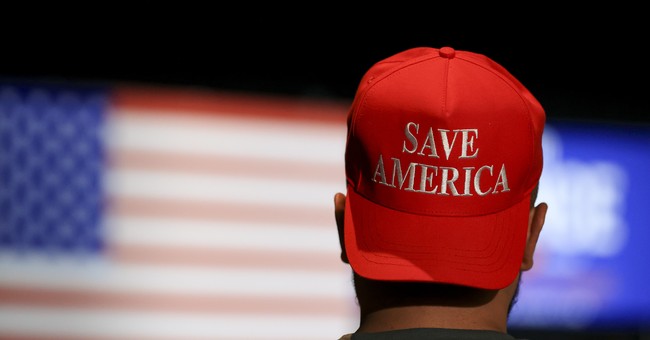Crossfire Hurricane agents never intended to drop their investigation of Donald Trump, and therefore any lies he told the FBI did not affect their decision-making, Igor Danchenko argued in a motion filed on Friday seeking dismissal of the criminal charges pending against him in a Virginia federal court. With the trial set to start next month, Special Counsel John Durham must now decide whether to acknowledge the deep state’s complicity or risk a second acquittal.
Durham charged Danchenko last year with five counts of making false statements to the FBI related to Danchenko’s role as Christopher Steele’s primary sub-source in the fake dossier the Hillary Clinton team peddled to the FBI and the media. According to the indictment, Danchenko lied extensively when he provided Steele with supposed intel, and then later made false representations to the FBI during a series of interviews.
One count of the indictment concerned Danchenko’s denial during an FBI interview on June 15, 2017, of having spoken with “PR Executive-1” about any material contained in the Steele dossier. According to Durham’s team, “PR Executive-1,” who has since been identified as the Clinton and DNC-connected Charles Dolan, Jr., told Danchenko that a “GOP friend” had told him Paul Manafort had been forced to resign from the Trump campaign because of allegations connecting Manafort to Ukraine.
“While Dolan later admitted to the FBI that he had no such ‘GOP friend’ and that he had instead gleaned this information from press reports, Dolan’s fabrication appeared in the Steele dossier.” But according to the indictment, when the FBI asked Danchenko whether he had talked with Dolan about that and other details included in Steele’s reports, Danchenko lied and said he hadn’t.
The four remaining counts of the indictment concerned Danchenko’s alleged lies during questioning by the FBI on March 16, May 18, October 24, and November 16, 2017, concerning conversations he supposedly had with Sergei Millian, who was the then-president of the Russian-American Chamber of Commerce. According to the indictment, Danchenko told FBI agents during those interviews that he believed Millian had provided him information during an anonymous phone call, including “intel” later included in the Steele dossier that there was “a well-developed ‘conspiracy of cooperation’ between the Trump Campaign and Russian officials.” However, no such call ever occurred, Durham’s team charged.
In seeking dismissal of these five counts, Danchenko’s attorneys argued in the motion to dismiss they filed on Friday that the government’s false statement charges failed as a matter of law because ambiguity in the FBI’s questions and in his own answers make it impossible to show he knowingly lied to the government. What proved more intriguing, however, was Danchenko’s second argument based on “materiality.” Here, in essence, Danchenko argued that his statements, even if knowingly false, could not create criminal liability because they were immaterial to the FBI’s investigation.
To support this argument, Danchenko notes that the FBI was already investigating Millian’s “potential involvement with Russian interference efforts long before it had ever interviewed or even identified Mr. Danchenko,” apparently based on Steele’s claim that Millian served “as the source of relevant information.” Accordingly, Danchenko maintains his supposed lies were not the reason the FBI targeted Millian.
Danchenko further emphasizes in his brief that Steele had falsely told the FBI that “Danchenko had reported meeting with [Millian] in person on multiple occasions.” Danchenko exposed Steele’s own lies by telling the FBI he had never met with Millian “and could not be sure he ever spoke to him,” Danchenko’s attorneys stress in their motion to dismiss, thus calling Steele’s “statements, and portions of the Company Reports, into question.” Yet, even after learning of Steele’s apparent lies, the FBI did not alter the course of the investigation and, in fact, continued to rely on Steele’s reporting to seek renewals of the FISA surveillance orders, Danchenko’s brief underscores to argue that nothing Danchenko said during his interviews really mattered to the FBI.
Because Danchenko’s statements failed to change the trajectory of the government’s investigation into Millian and more broadly Trump and his associates, Danchenko posits that “it is difficult to fathom how the government would have made any decision other than to continue investigating [Millian] … regardless of what Mr. Danchenko told them.” In other words, Danchenko’s alleged lies were immaterial.
As a matter of law, Millian’s materiality argument is weak, but as a matter of defense-attorney rhetoric, it holds the potential to score Danchenko an acquittal.
Potential for Acquittal
The legal standard for materiality requires a false statement to have “a natural tendency to influence, or [be] capable of influencing, either a discrete decision or any other function of the agency to which it is addressed.” Further, “the falsehood need not actually influence the agency’s decision-making process, but merely needs to be ‘capable’ of doing so.” Thus, legally speaking, that the Crossfire Hurricane team, and later Special Counsel Robert Mueller’s office, seemed unconcerned with what Danchenko said, as shown by their continued reliance on Steele and his dossier, is irrelevant. The question is whether the lie was capable of influencing how a hypothetically “objective” government official would have acted had they known the truth.
While Durham’s team will argue to the jury — assuming the district court denies Danchenko’s motion to dismiss the indictment — that the alleged lies were capable of influencing several decisions of the FBI agents, the reality is that the jurors will have a hard time buying that proposition unless Durham exposes the malfeasance of the Crossfire Hurricane agents and the members of Mueller’s team. In short, Durham needs to tell the jury that Danchenko’s alleged lies did not actually influence the government’s investigation because the agents were out to get Trump.
If the Special Counsel’s office does not take this tack, what the jury will hear is the story Danchenko previewed in his motion to dismiss:
“During the course of its investigation into the [Steele dossier], the FBI determined that the defendant, Igor Danchenko, was a potential source of information contained in the [dossier]. In order to assist the FBI in its investigation of the accuracy and sources of the information in the [dossier], Mr. Danchenko agreed to numerous voluntary interviews with the FBI from in or about January 2017 through November 2017. He answered every question he was asked to the best of his ability and recollection. As part of the 2017 interviews, FBI agents asked Mr. Danchenko to review portions of the [dossier] and describe where he believed the relevant information had derived from and to explain how any information he had provided to [Steele] may have been overstated or misrepresented in the [dossier].”
Danchenko did as the FBI asked, his defense will argue to the jury, before stressing that even after Danchenko highlighted Steele’s lies to the bureau, agents continued to investigate Millian. This fact will serve as a lynchpin for Danchenko to argue that his statements, even if false, were immaterial.
A Likely Argument
In his motion to dismiss, Danchenko previewed another argument likely to be repeated at trial, namely that no one thought Danchenko lied until the appointment of a second special counsel. “The Special Counsel’s office closed its entire investigation into possible Trump/Russia collusion in March 2019,” Danchenko noted in his motion, stressing that while “approximately thirty-four individuals were charged by Mueller’s office, including several for providing false statements to investigators. Mr. Danchenko was not among them. To the contrary, not only did investigators and government officials repeatedly represent that Mr. Danchenko had been honest and forthcoming in his interviews, but also resolved discrepancies between his recollection of events and that of others in Mr. Danchenko’s favor.”
While these arguments are currently aimed at the court, a repeat will surely follow during next month’s trial, and unless Durham provides the jury with an explanation for the FBI and Mueller’s lack of concern over Danchenko’s statements to investigators, an acquittal seems likely.
Durham’s Strategy
We won’t have to wait until the start of the trial to learn Durham’s likely strategy, however, as the government’s response to Danchenko’s motion to dismiss will likely provide some strong hints, especially given some of the assertions included in Danchenko’s brief. For instance, in his summary of the facts, Danchenko claimed, based on the DOJ’s inspector general report, that there was an “articulable factual basis” to launch Crossfire Hurricane based on “information received from a Friendly Foreign Government.” The “information received from a Friendly Foreign Government” refers to then-Australian diplomat Alexander Downer’s claim that Trump campaign adviser George Papadopoulos made suggestions that the Russians could assist the Trump campaign with the release of damaging information about Clinton.
Those well-versed in the Russia-collusion hoax will remember that Durham has already publicly pushed back against the Inspector General’s claim that Downer’s tip prompted the launching of Crossfire Hurricane. Durham released a statement following the publication of the IG report contradicting the IG’s assertion and revealing that “based on the evidence collected to date,” his team had “advised the Inspector General that we do not agree with some of the report’s conclusions as to predication and how the FBI case was opened.”
Another passage in Danchenko’s brief could similarly prompt pushback by Durham. Relying again on the inspector general’s report on FISA abuse, Danchenko asserts that there is “no evidence the [Steele] election reporting was known to or used by FBI officials involved in the decision to open the Crossfire Hurricane investigation.”
Two years have passed since the IG issued its report, however, and during that time Durham has been continuing to investigate the claimed predication of Crossfire Hurricane. If his team found evidence that Steele’s reporting prompted the launch of Crossfire Hurricane, Danchenko’s motion provides a perfect opportunity for Durham to publicly reveal that evidence.
Whether Durham will reveal these details and others remains to be seen. And while the special counsel’s office used pretrial court filings in the criminal case against former Clinton campaign attorney Michael Sussmann to pepper the public with new revelations about the Russia-collusion hoax, the lead prosecutor in that case, Andrew DeFilippis, is no longer prosecuting the case against Danchenko. We should know soon whether Durham, who is now personally involved in the Danchenko prosecution, will use the case to expose more details about SpyGate.
Durham has already filed his first motion in limine, or a pretrial request for the court to rule on the admissibility of evidence, in the Danchenko case. That motion, however, concerns classified information and was thus sealed. The special counsel will likely be filing several more motions in limine in the weeks to come, with the court last week entering an order encouraging the parties to file those motions “as early as possible,” but no later than October 3, 2022, absent good cause.
Those motions, as well as Durham’s response to Danchenko’s motion to dismiss, will provide some insight into the special counsel’s planned strategy in the Danchenko case and specifically whether the special counsel will highlight the complicity of the deep state in the Russia-collusion hoax. If Durham doesn’t, it might cost his team a second loss.










